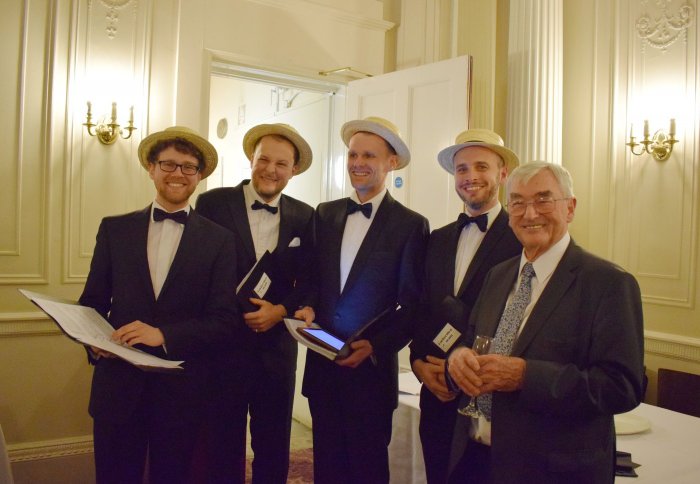Celebrating a legacy of fighting schistosomiasis

On 7 December, guests celebrated the lifetime achievements of Professor Alan Fenwick OBE, a global leader in the fight against schistosomiasis.
A career devoted to eliminating the harmful effects of schistosomiasis
Professor Fenwick’s career began in Tanzania in 1966, where as a researcher, he witnessed first-hand the detrimental health and economic impact of schistosomiasis on the local population.
Through his experiences in Tanzania, Egypt and the Sudan, he felt compelled to do everything possible to ensure access to free schistosomiasis treatment for those that could not afford it.
Determined, Professor Fenwick convinced the Bill & Melinda Gates Foundation of the plausibility of his vision, securing the second grant they ever made, and established the Schistosomiasis Control Initiative (SCI) at Imperial College London in 2002. The SCI had a single objective, to prove that it was possible to develop and deliver a schistosomiasis control programme at a national scale, that was replicable across sub Saharan Africa.
By 2008, Professor Fenwick and his impressive team had helped establish national schistosomiasis control programmes in 6 divergent countries, 3 Anglophone countries in east Africa and 3 Francophone countries in West Africa.
With proof of principle in his hands, he realised that the cost of treatment was the next hurdle that had to be overcome. There was no way that Ministries of Health across Africa could afford to purchase praziquantel (the medication to treat schistosomiasis) at market rate. Thus, his advocacy work started in earnest to reduce the cost of treatment further or secure the drug for free. In 2010, his resolve bore fruit, with the announcement by Merck KGaA of an annual donation programme of 200 million tablets of praziquantel.
Alongside these impressive achievements, Professor Fenwick has throughout “infected” others with his passion and resolve to help the poorest of the poor, securing millions of pounds in donations, which the SCI has utilised to assist countries to expand their national schistosomiasis control programmes more quickly than they would otherwise be able to afford.
When Professor Fenwick started the SCI, not a single country in Africa had a national schistosomiasis control programme. Fifteen years later the picture is very different. All endemic countries have a World Health Organization (WHO) approved programme and the SCI is currently helping the governments of 16 countries to treat over 30 million people annually. More countries are set to start programmes in the new year and the expectation is that with the SCI’s assistance, around 50 million people will receive treatment for schistosomiasis in 2017.
Professor Fenwick’s ambition to help the poorest of the poor at scale, through the control of schistosomiasis, has been realised. He can retire in the knowledge that his hand-selected dedicated team will build on his legacy, expanding access to treatment to many more countries, with the goal of one-day eliminating the disease.
Dr Wendy Harrison will succeed Professor Fenwick as the CEO of SCI, with Professor Fenwick continuing his advocacy work for the organisation and the wider neglected tropical diseases community.
An influential career
Over sixty guests attended Professor Fenwick’s retirement event on December 7, many of whom travelled from abroad to join the celebrations.
It was clear from the diversity of guests, which included former students, distinguished researchers and government officials, and of course his family, just how many lives he has influenced over the years.
Professor Elio Riboli and Professor Sir Roy Anderson, each gave a speech, relaying their personal experiences working with Professor Fenwick over the years and detailing his many achievements in the field.
It was a light-hearted evening, complete with a Barbershop Quartet, much in keeping with Professor Fenwick’s character. Many will agree that even with all his experience and achievements, Professor Fenwick remains one of the most approachable, charismatic, and generous individuals, with a great sense of humour.
Dr Anouk Gouvras, a previous student of Professor Fenwick’s, commented:
"I will always be grateful to Alan for the many opportunities he gave me to work in different countries in sub-Saharan Africa during my PhD. He has always been supportive and fun, but also someone with a clear vision, who expected hard work from all his staff and students. He always reminded us that at the heart of the science and research, are real people afflicted by a chronic debilitating disease, and that whatever personal motivation or ambition drove us, helping these people, improving public health and the quality of life for the poorest communities was, and had to be, the end goal of all our work. I know Alan will continue to remind us of this even into his retirement and look forward to seeing him continue to spread the message! I thank him once again.“
Professor David Molyneux, a fellow leader in the field of neglected tropical diseases and long-time friend and colleague of Professor Fenwick’s, made the following comments on his experiences:
“The privilege of pushing together a new idea and policy agenda with Alan and others has been one of the most satisfying aspects of my career. The inclusion of NTDs in the UN Sustainable Development Goals would not have been possible without Alan’s role in highlighting the massive schistosomiasis problem. The successes of the SCI have been down to Alan creating a team, infecting his colleagues with his enthusiasm and energy, and building a base of donors which has resulted in health benefits for millions of the poorest.”
Professor Fenwick’s full-time presence will no-doubt be missed at the SCI, but will likely be as busy as he has always been advocating for the organisation he founded. We all wish him the very best in his retirement.
Article text (excluding photos or graphics) © Imperial College London.
Photos and graphics subject to third party copyright used with permission or © Imperial College London.
Reporter
Mrs Alexandra Grainger
School of Public Health